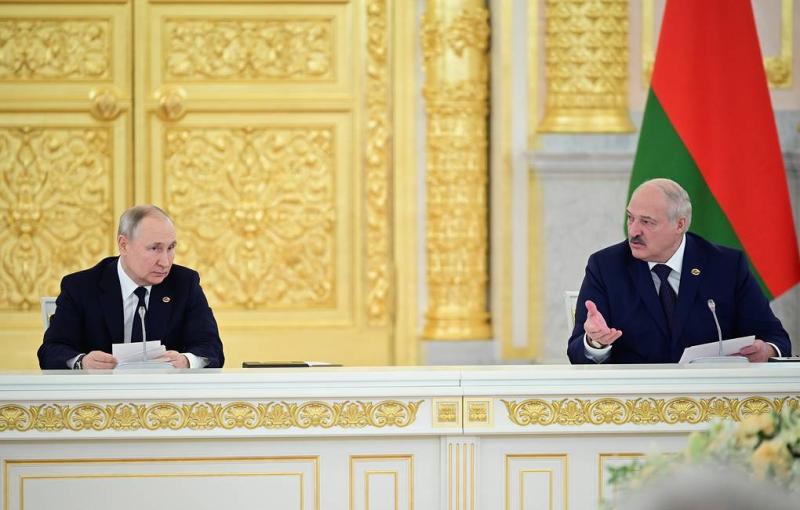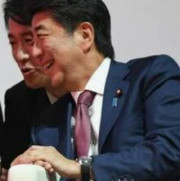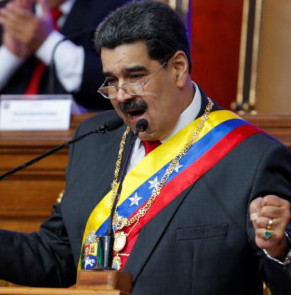
© Pavel Byrkin/Russian President Press Office/TASS
Top stories from the Russian press on Friday, April 7th, prepared by TASS
Russia and Belarus discuss drafting a joint security concept at key Kremlin meeting; Beijing becomes a popular destination for top Western diplomats and politicians; and experts weigh in on the Jerusalem conflict. These stories topped Friday’s newspaper headlines across Russia.
Vedomosti: Russia, Belarus to draft joint security concept
On Thursday, the Supreme State Council of the Russia-Belarus Union State convened a meeting at the Kremlin that was attended by Russian President Vladimir Putin and his Belarusian counterpart, Alexander Lukashenko. There were seven topics on the agenda of the closed-door meeting, including a resolution on drafting a security concept, said Dmitry Mezentsev, State Secretary of the Union State. However, the meeting did not discuss the deployment of strategic nuclear weapons in Belarus as a follow-on to the announced deployment of tactical nukes, a potential move that Lukashenko had announced in his address to the nation on March 31, Vedomosti writes.
Russia is interested in Belarus as its ally, Andrey Suzdaltsev, associate professor at the Higher School of Economics (HSE University), told the newspaper. "The Belarusians are demanding that the Russian market be opened up to them. The special military operation offers wide opportunities for them. Meanwhile, Belarus represents a potential northern front for Russia," he added.
The organization of joint import substitution efforts was a key issue at the meeting, according to Nikolay Mezhevich, who heads the Center for Belarusian Studies at the Russian Academy of Sciences’ Institute of Europe. In his view, Belarus’ economic potential should not be underestimated. As for military integration, Moscow and Minsk are facing practically identical external threats, he said.
The Belarusian leadership is seeking to ensure beneficial energy supplies from Russia, and the stable transit of its potash fertilizers through Russia’s Baltic ports, says Vyacheslav Sutyrin of the State Academic University for the Humanities. Also, the two countries continue to discuss economic roadmaps, including efforts to finalize customs agreements. According to Sutyrin, the tactical issues of placing nuclear weapons on Belarusian territory play a decisive role, which strengthens Minsk’s defense alliance with Moscow.
Kommersant: China drawing more high-level visitors, gaining greater geopolitical weight
On Thursday, Saudi Foreign Minister Faisal bin Farhan Al-Saud and his Iranian counterpart, Hossein Amir-Abdollahian, held their first meeting in Beijing after the two countries agreed to restore diplomatic relations. Thus, not only had Riyadh and Tehran selected a neutral venue for talks, but they also paid tribute to China, which played a crucial role in the two countries’ reconciliation. It is noteworthy that on Thursday Beijing became a key hub for global diplomacy, as it also hosted a high-level visit from French President Emmanuel Macron and European Commission President Ursula von der Leyen.
In March, Spanish Prime Minister Pedro Sanchez also visited the Chinese capital, where he called on Chinese leader Xi Jinping to contribute to ending the Russia-Ukraine conflict as soon as possible and to hold talks with Ukrainian President Vladimir Zelensky.
Ahead of her Chinese trip, von der Leyen warned that Beijing’s steps in the context of the Ukrainian crisis would be decisive in how the country’s relations with the European Union would evolve. She was echoed by EU foreign policy chief Josep Borrell when he told reporters that he would visit Beijing next week. "There is a clear expectation from a permanent member of the [UN] Security Council to stand up in defense of [the] international rules-based order, and China has a moral duty to contribute to a fair peace," he emphasized.
Xi responded to these statements during his meeting with Macron and von der Leyen. He said that China viewed the EU as "an independent pole in a multipolar world" and that Beijing supported the bloc’s strategic independence. According to the Chinese leader, the China-EU relationship does not target any third party, nor should it be dependent on or dictated to by any third party.
At the same time, Xi expressed readiness to work with France "to jointly address the spillover effects of the Ukraine crisis in food, energy, finance, transportation and other fields, and reduce the negative impact of the Ukraine crisis on the world, especially on developing countries."
Vedomosti: Experts weigh in on conflict around Al-Aqsa Mosque
The unrest surrounding the Al-Aqsa Mosque in Jerusalem has led to an outbreak of violence between Israel and opposition groups. On April 6, Israel was targeted by 34 rockets fired from Lebanese territory in what was the worst attack since 2006; it followed an attack from Gaza the day before. The Al-Aqsa conflict erupted after calls by far-right Jewish activists for a Passover sacrifice at the Temple Mount, where the mosque is located. In response, the Palestinians barricaded themselves in the building and refused to leave.
The office of Israeli Prime Minister Benjamin Netanyahu said on Thursday that the premier would discuss the situation with security officials. The political crisis and protests over controversial judicial reforms are still raging in Israel, even though Netanyahu announced a freeze on the judicial overhaul, Vedomosti writes.
Assaults on Al-Aqsa by Israeli forces during Ramadan have already become a tradition and have been conducted before, Kirill Semyonov, an expert with the Russian International Affairs Council, told the newspaper. An escalation was expected after the coalition with far-right parties came to power in Israel and, against the backdrop of the political crisis, this government may as well try to shift the attention to the conflict between the Palestinians and Hezbollah, the expert assumes. It is unclear how the divided Israeli society, on the one hand, and Hamas and Hezbollah, on the other, would behave, says Semyonov. The fact that neither of the two camps has so far claimed responsibility for the attacks could help avoid further escalation, but the crisis could also aggravate Israel’s relations with the UAE or other Arab countries, he warns.
To Lyudmila Samarskaya, a researcher at the Institute of World Economy and International Relations (IMEMO) of the Russian Academy of Sciences, the Al-Aqsa events were a rather tragic accident that became more acute as Ramadan and Passover celebrations coincided. Meanwhile, the Palestinians have so far refrained from large-scale actions, she said, while rising tensions could give Netanyahu yet another reason to form a national guard under the control of far-right National Security Minister Itamar Ben-Gvir. The creation of an auxiliary force to assist the police in quelling riots has been discussed since 2021, as the police have proven inadequate and such a role is not entirely appropriate for the army. Ben-Gvir obtained the prime minister’s consent to form a national guard in exchange for the latter’s agreement to suspend the judicial reform that had sparked massive protests in Israel, Samarskaya concluded.
Rossiyskaya Gazeta: World Bank sees Russia faring better than previously expected in 2023
The World Bank on Thursday upgraded its 2023 economic growth forecast for Russia, citing the higher-than-expected growth seen last year and a more modest decline in the country’s production of oil and petroleum products thus far this year.
Experts at the World Bank are now expecting the Russian economy to contract by only 0.2%, compared to the previous forecast of a 3.3% drop. According the international financial institution’s updated estimate, the Russian economy shrank 2.1% last year, while it had forecast a 3.5% decline for 2022 in January.
In its January forecast, the World Bank warned that the global economy would see a sharp slowdown in 2023 and that global GDP growth would be at one of the weakest levels seen over the past 30 years. The organization made downward revisions in its 2023 GDP forecasts for the United States (to 0.5%), China (4.3%), Europe and Central Asia (0.1%).
World Bank Chief Economist Indermit Gill warned earlier that "a lost decade could be in the making" for the world economy and that the ongoing decline in average global potential GDP growth would have major implications for the world’s ability to address "the expanding array of challenges."
Kommersant: Russia gains foothold in global cryptocurrency mining, taking second place
In January-March, Russia became the world’s second-largest consumer of energy for cryptocurrency mining, and now consumes 1 GW for this purpose, according to BitRiver. The United States remains the leader in this metric at 3-4 GW. In previous years, Russia held third place.
According to BitRiver experts, the positive trend is due to last year’s restrictions on cryptocurrency mining in Kazakhstan and earlier in China, where there was an electricity shortage. However, since the US remains the leader in total mining hashrate, market players will focus on actions by US regulators, ENCRY Foundation co-founder Roman Nekrasov told Kommersant. In particular, he warned, they [US regulators] could spark the latest carve-up of the mining market, as occurred in 2021 after China clamped down on crypto miners.
The rise in Russia’s mining capacities was entirely expected, as certain regions of the country offer highly lucrative opportunities for mining cryptocurrencies in terms of electricity costs, said EMCD Marketing Director Alisa Tsukanova. And, yet, there are still factors that hamper mining growth in Russia, experts say. A bill on regulating [crypto] mining was submitted to the State Duma last November, but the lower house of Russia’s parliament has yet to consider it.
Also, foreign policy risks have been growing for Russian crypto miners. Among these, Mikhail Brezhnev, a co-founder of 51ASIC, points to the potential strengthening of sanctions on Russian companies and secondary restrictions against banks, securities exchanges, pools and other foreign players that work with Russian miners.









